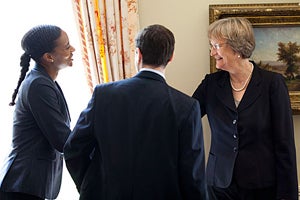The following story “Encouraging a Life’s Work,” by Katie Koch, appeared in the May 10 edition of the Harvard Gazette. It has been adapted below.
As a second-year student at Harvard Law School, Crystal Redd could be preparing to spend a summer in New York or Washington at a prestigious firm. Instead, she’ll be heading to Georgia and Alabama, fighting not for a plum associate position but for the lives of poor defendants facing the death penalty.
In choosing a public service path, Redd faces a host of career unknowns, starting with where she’ll find her first post-law school job. (Nonprofits, after all, aren’t known for launching massive recruiting efforts on campus.) But thanks to University support, Redd feels ready to take the plunge and pursue her passion for community work.
“I think we need to let people know it’s OK to not know exactly what you’ll be doing after graduation,” said Redd, who will work this summer at the Advancement Project and with the Southern Center for Human Rights.
With that in mind, Harvard President Drew Faust sat down with Redd, who was one of 10 students chosen as a 2012 Presidential Fellow for their commitment to public service initiatives. They engaged in a candid discussion of what the University can do to promote public service across Harvard’s Schools. The University honored the group, only the second to be awarded the grants from the Presidential Public Service Fellowship Program, during a luncheon at the Harvard Faculty Club on April 27.
“We want to continue to build a culture here that’s supportive of public service,” Faust said. “We want public service to have a high profile as a very important consideration for a life’s work.”
Begun last year, the program provides grants of up to $5,000 for undergraduates and $8,000 for graduate students to fund summer projects across a wide range of areas and interests, from nonprofits and government agencies to community initiatives and social ventures. An anonymous donor funds the program.
Through the fellowship program and other initiatives, Faust said, the University hopes to broaden students’ conception of what public service can be, repositioning it not as a side interest but as a central part of a fulfilling career.
In addition to Redd, HLS student Angela Chuang was also named a Presidential Fellow. Chuang, who serves as an executive editor for the Harvard International Law Journal and as a managing technical editor for the Harvard Human Rights Journal, will intern this summer at New York County Defender Services (NYCDS) in New York City. She will work with attorneys in the newly created Immigration Unit and assist them with representing indigent clients who are accused of committing crimes and who may be subject to collateral immigration consequences as a result of a conviction. She will also argue in court as a student attorney and will have the opportunity to second-chair a criminal trial.
This year’s fellows, drawn from six schools and programs at the University, will work with legal aid groups, school districts, and community theater groups. One fellow will head to the White House to help improve performance management in the federal government, while another will run a community garden for at-risk youth in Boston’s Mission Hill neighborhood.
The fellowship program, managed by the Office of the President, aims to expand its horizon beyond the summer by offering fellows resources to continue their public service once they return to campus.
Fellows will be able to take online courses through the Center for Workplace Development and the Harvard Extension School and will have access to Rosetta Stone language software, helping them to build their skills in accounting, foreign languages, website design, or other topics that might help them to launch their own social initiatives.
The fellows will be able to turn to each other, as well as to last year’s inaugural cohort, who also attended the luncheon to share their experience.
“This is a wonderful opportunity,” said 2012 fellow Mackenzie Hild, a college sophomore, who will spend the summer on a Navajo reservation in New Mexico collaborating with a doctor and the local community to improve nutrition. “It’s great to feel supported by your peers in doing this kind of work.”
Biographies of past and current fellows can be found here.
